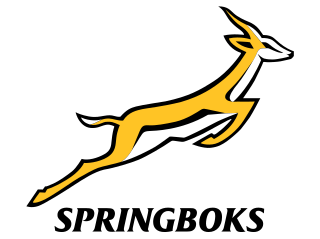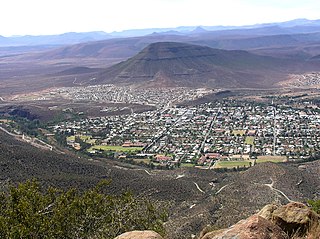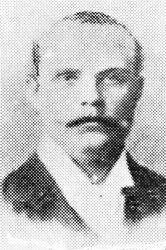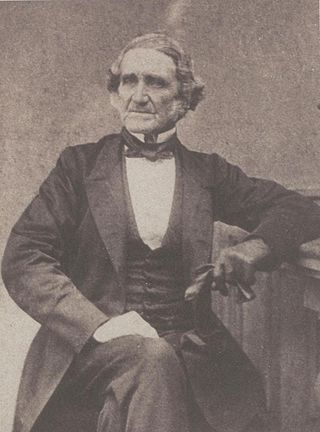Related Research Articles

Bloemfontein, also known as Bloem, is the capital and the largest city of the Free State province in South Africa. It is often, and has been traditionally referred to, as the country's "judicial capital", alongside the legislative capital Cape Town and administrative capital Pretoria, although the highest court in South Africa, the Constitutional Court, has been in Johannesburg since 1994.

The South Africa national rugby union team, commonly known as the Springboks, is the country's national team governed by the South African Rugby Union. The Springboks play in green and gold jerseys with white shorts. Their emblem is a native antelope, the Springbok, which is the national animal of South Africa. The team has been representing South Africa in international rugby union since 30 July 1891, when they played their first test match against a British Isles touring team. They are currently the reigning World Champions and have won the World Cup on three occasions,. The Springboks are equalled with the All Blacks with three World Cups.

Uitenhage, officially renamed Kariega, is a South African town in the Eastern Cape Province. It is well known for the Volkswagen factory located there, which is the biggest car factory on the African continent. Along with the city of Port Elizabeth and the small town of Despatch, it forms the Nelson Mandela Bay Metropolitan Municipality.

Graaff-Reinet is a town in the Eastern Cape Province of South Africa. It is the oldest town in the province. It is also the sixth-oldest town in South Africa, after Cape Town, Stellenbosch, Simon's Town, Paarl and Swellendam. The town was the centre of a short-lived republic in the late 18th century. The town was a starting point for Great Trek groups led by Gerrit Maritz and Piet Retief and furnished large numbers of the Voortrekkers in 1835–1842.

Gqeberha, previously named Port Elizabeth, and colloquially referred to as P.E., is a major seaport and the most populous city in the Eastern Cape province of South Africa. It is the seat of the Nelson Mandela Bay Metropolitan Municipality, South Africa's second-smallest metropolitan municipality by area. It is the sixth-most populous city in South Africa and is the cultural, economic and financial hub of the Eastern Cape.

Qonce, or King William's Town, is a town in the Eastern Cape province of South Africa along the banks of the Buffalo River. The town is about 60 kilometres (37 mi) northwest of the Indian Ocean port of East London. It has a population of around 35,000 inhabitants and forms part of the Buffalo City Metropolitan Municipality.

The Southern Spears, were a South African rugby union franchise who were founded in 2005 and were intended to participate in Super 14 from 2007 onwards; however, their proposed entry into the competition led to considerable controversy within the country's rugby establishment. In April 2006, after concerns over the franchise's financial stability and sporting competitiveness, the Spears were denied entry into the Super 14. Following this, the Southern Spears effectively ceased to exist. In June 2009, the Southern Kings, a Port Elizabeth based Super Rugby team, was established and is not connected with the former outfit.
EPRU Stadium, also known by its original name of Boet Erasmus Stadium, was a stadium in Port Elizabeth, South Africa. The letters "EPRU" in the name represent the Eastern Province Rugby Union, the stadium's historic primary tenants, whose team is now known as the Mighty Elephants. The original name Boet Erasmus Stadium was named after Boet Erasmus, a former mayor of Port Elizabeth. The stadium held a capacity of 33,852 people and served primarily as a venue for rugby union matches but also hosted a number of association football (soccer) fixtures.

Alfred Renfrew Richards was a South African sportsman who represented his country at Test cricket and rugby union. Born in Grahamstown, Cape Colony, and educated at The Leys School in Cambridge, Richards was capped three times for South Africa in rugby, including captaining them once, and made one Test cricket appearance, also as captain.
Australian rules football in South Africa is a team sport played at amateur level in the country with a small audience. The governing body is AFL South Africa.

Rugby union in South Africa is a highly popular team sport, along with cricket and soccer, and is widely played all over the country. The national team is among the strongest in the world and has been ranked in at least the top seven of the World Rugby Rankings since its inception in 2003. The country hosted and won the 1995 Rugby World Cup, and won again in 2007 and 2019.

Herbert Hayton Castens was a South African rugby union footballer and cricketer. He captained South Africa at both rugby and cricket, and played an important role in the development of rugby and cricket in South Africa, both on and off the field. He was usually known as H. H. Castens.
This article describes the history of South African cricket from its known beginnings until the end of the First World War in 1918.

The Southern Kings were a South African professional rugby union team that competed in Super Rugby and Pro14. They were based in Port Elizabeth in the Eastern Cape province and played their home matches at Nelson Mandela Bay Stadium. They were created in 2009, and had their first match against the British & Irish Lions during their 2009 tour. After competing in Super Rugby in 2013, 2016 and 2017, they joined Pro14 prior to the 2017–18 season, along with the Cheetahs.

Established in 1950, the East Africa rugby union team is a multi-national rugby union team drawing players from Kenya, Uganda and Tanzania, though the vast majority of these came from Kenya which has traditionally been the strongest rugby playing nation in the region. The team has played against incoming international, representative and club touring sides and it conducted seven tours between 1954 and 1982.

Paul Robert Clauss was a German-born rugby union three-quarter who played club rugby for Oxford and Birkenhead Park. Clauss was a member of the first official British Isles tour in 1891 and also represented Scotland on six occasions. He was part of two Triple Crown winning teams for Scotland, and made an impressive international start in the 1891 Championship, scoring in all three Scotland games.

Hercules Crosse Jarvis MLC, MLA, was a mayor of Cape Town and a powerful merchant of the Cape Colony.
Stephen Perry Fry was a South African rugby union player, most often playing as a flanker. Fry played rugby for his home town of Somerset West and provincial rugby for Western Province. He won 13 caps for the South African national team, and captained the country in four matches against the British Lions.
Dr. Desmond John Sinclair was a South African rugby union centre. Sinclair played club rugby for Wanderers and provincial rugby for Transvaal. He was capped for South Africa four times in 1955, though he was first selected to play for the Springboks on the 1951–52 South Africa rugby tour of Great Britain, Ireland and France; but was never selected for an international game on that tour. The touring team of 1951/52 is seen as one of the greatest South African teams, winning 30 of the 31 matches, including all five internationals.
Wilhelm Julius Heinrich Kahts is a former South African rugby union player.
References
- ↑ "CTCC - Cape Town Cricket Club". www.ctcc.co.za. Retrieved 8 January 2016.
- ↑ "Rugby Football History". www.rugbyfootballhistory.com. Retrieved 8 January 2016.
- ↑ "SA Soccer timeline 1862-1974". www.sahistory.org.za.
- ↑ "South Africa and the Olympic Games". www.sahistory.org.za. Retrieved 8 January 2016.